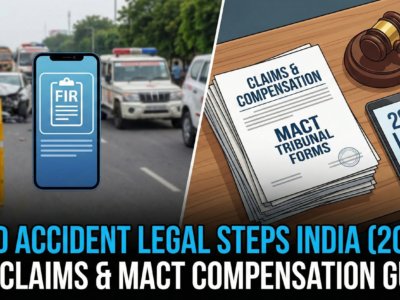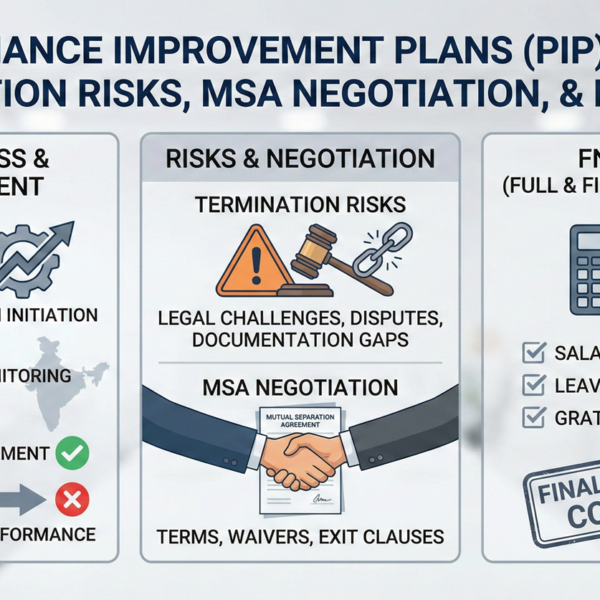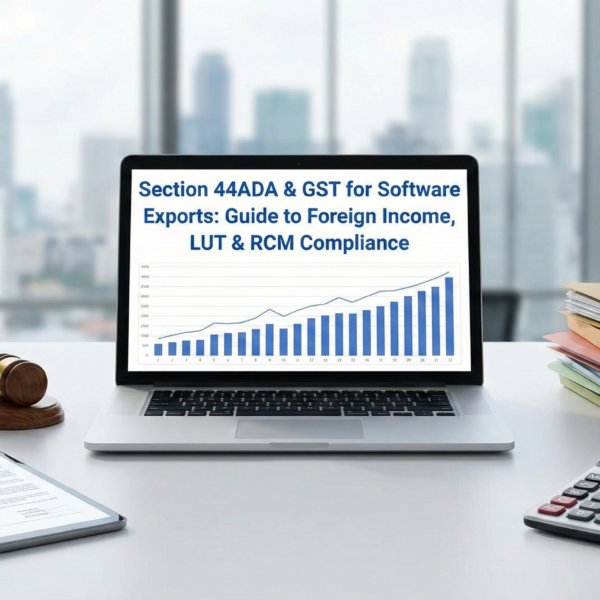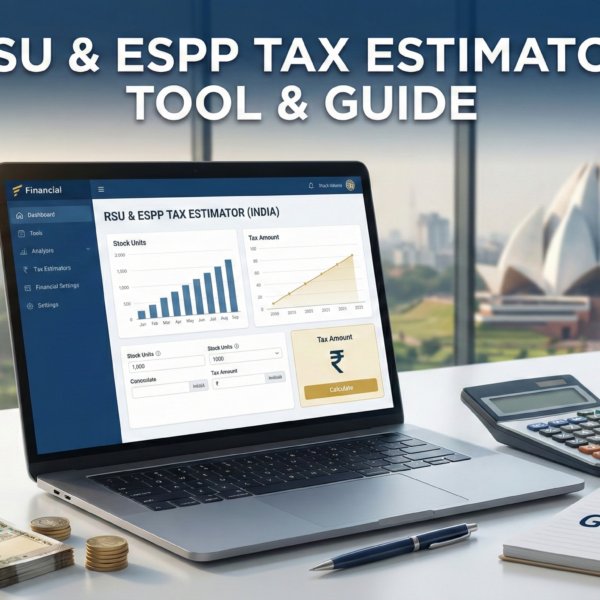Is your former employer making you wait endlessly for your full and final (F&F) settlement? Are you being told to wait for a “45-day processing period”? It’s time to understand that this is often an administrative excuse, not a legal right. The law is on your side, with strict deadlines that your employer may already be violating.
This comprehensive guide from Evaakil.com is designed to empower you to take control. We go beyond generic advice to give you the specific legal knowledge and actionable tools needed to recover every rupee you are owed. Here, you will find a step-by-step strategy, from drafting a powerful legal notice to filing a complaint with the Labour Commissioner. You’ll learn how to calculate your exact dues, including interest on delayed gratuity, and even explore advanced options like filing a fast-track Summary Suit in a civil court.
Stop waiting and start acting. Let’s begin the process of securing your hard-earned money.
Employer Delaying Your Final Settlement?
Don't just wait. Understand your legal rights, calculate your dues, and take decisive action. This guide provides the tools you need to recover what you're owed.
Understanding Your Rights: The Legal Framework
When your employment ends, the final settlement isn't a courtesy; it's a legal obligation on your employer. Delays are a direct violation of your rights. Let's break down what you're owed and the laws that protect you.
What's in Your Full & Final (F&F) Settlement?
Unpaid Salary
Pro-rata salary for your last month, plus any arrears.
Leave Encashment
Payment for your unavailed earned/privilege leaves.
Gratuity
A statutory benefit if you've served 5+ years.
Bonuses & Incentives
Any earned but unpaid statutory bonus or performance pay.
Reimbursements
Approved but unpaid expenses for official purposes.
Find Your Legal Shield: Which Law Applies to You?
Your Primary Remedy: The Payment of Wages Act, 1936
Since your wage is ₹24,000 or less, this powerful Act is your primary tool. It explicitly includes final settlement dues under "wages".
Key Provision:
Section 5(2) mandates that your final wages must be paid within 2 working days of your termination.
Your Primary Remedy (in West Bengal): The WB Shops & Establishments Act, 1963
As your wage exceeds the ₹24,000 limit of the PW Act, this state-specific law protects you if you work in a "shop" or "commercial establishment" in West Bengal.
Key Provision:
Section 14 states that all wages must be paid by the 10th day of the next month.
For All Employees (if eligible): The Payment of Gratuity Act, 1972
This law applies to you regardless of your salary level, provided you have completed at least 5 years of continuous service.
Key Provision:
Section 7(3) mandates gratuity payment within 30 days of your last day. Delay automatically triggers a 10% per annum interest penalty on the employer.
Busting the "45-Day" Myth: When Does the Clock *Really* Start?
Employers often quote a 30-45 day processing time. This is an internal administrative timeline, NOT a legal grace period. Your legal right to payment starts much, much earlier. The delay isn't one event; it's a series of legal breaches.
Strategic Edge: "Unbundling" the Cause of Action
Instead of seeing the F&F delay as a single problem, frame it as a series of distinct legal violations. This strengthens your complaint by showing a pattern of non-compliance, making it harder for the employer to claim an administrative oversight.
Day 0: Last Working Day
The countdown begins. All your dues are now crystallised.
Day 3: First Legal Breach (Payment of Wages Act)
If the Act applies, your employer is now in violation for non-payment of final salary.
Day 11 (of next month): Second Breach (WB Shops & Estb. Act)
If this Act applies, your employer is now in violation.
Day 31: Third Legal Breach (Payment of Gratuity Act)
Your employer is now in violation and owes you 10% p.a. interest from this day forward.
Your 3-Phase Strategy for Recovery
A systematic, escalating approach maximizes your chances of success while building a strong case.
Phase 1: Formal Communication
Build a paper trail. Start with a professional email reminder. If that fails, send a formal Legal Notice through a lawyer. This signals you're serious and often forces the company's legal team to intervene and settle.
Phase 2: Administrative Remedy
File a complaint with the Labour Commissioner's Office. This is a low-cost, quasi-judicial process where an officer will mediate the dispute. They have the power to order payment and impose penalties of up to 10 times the owed amount.
Procedural Details (West Bengal)
- Application Form: File the complaint in duplicate using the official Form N.
- Court Fees: A nominal fee must be paid via court-fee stamps (10 paise per ₹20 claimed).
- Limitation Period: You must file within six months from the date wages became due.
- The Hearing: The authority issues a summons in Form O to both parties for a conciliation hearing.
Phase 3: Judicial Escalation
For high-value claims or non-compliant employers, go to court. A Civil Court offers binding decrees. For a fast-track option, a Summary Suit (Order 37, CPC) can be filed, which forces the employer to prove they have a valid defense, otherwise a decree is passed immediately.
Civil Court Deep Dive: For High-Value Claims
When administrative remedies are insufficient, or for substantial claims, the civil court offers powerful tools. The Summary Suit is your most potent weapon.
The Summary Suit: Your Fast-Track Judicial Weapon
A Summary Suit under Order 37 of the Code of Civil Procedure is designed for recovering a fixed sum of money based on a written contract (like your appointment letter). Its key advantage is reversing the burden of proof.
- The employer has no automatic right to defend themselves.
- They must first apply for "leave to defend" by proving to the court they have a substantial, genuine defense.
- If their defense is frivolous, the court will refuse leave and immediately pass a decree in your favor.
For corporate employees, this often qualifies as a "commercial dispute," allowing it to be filed in a specialized Commercial Court, further speeding up the process.
Navigating Pecuniary Jurisdiction in West Bengal
Filing in the wrong court will get your case dismissed. The "pecuniary jurisdiction" (monetary value of the claim) determines the correct court.
| Location of Employer | Value of Claim (Suit Valuation) | Appropriate Court |
|---|---|---|
| Within Kolkata | Up to ₹10 Lakhs (Non-Commercial Suit) | City Civil Court, Kolkata |
| Within Kolkata | > ₹10 Lakhs and up to ₹1 Crore (Commercial Dispute) | Commercial Division, City Civil Court, Kolkata |
| Within Kolkata | Above ₹1 Crore | High Court at Calcutta (Original Side) |
| Outside Kolkata | No upper limit for senior courts | Civil Judge (Junior/Senior Division) or District Court |
Quantify Your Claim: The Interactive Calculator
Don't just estimate – calculate. Use this tool to get a clear breakdown of your potential claim. This is the number you'll use in your legal notice.
Total Estimated Claim
₹0
Actionable Toolkit: Ready-to-Use Templates
Here are model drafts you can adapt. A notice from a lawyer's office is always more effective, but these templates provide the correct legal structure and language.
Model Legal Notice
**ADVOCATE'S LETTERHEAD**
Ref. No.: [Your Ref]
Date: [Date]
REGISTERED A.D.
To,
[Name of the Company]
Through its Managing Director / CEO / Head of HR
[Company Address]
Subject: Legal Notice for immediate payment of outstanding Full and Final (F&F) settlement dues...
Sir/Madam,
Under instructions from and on behalf of my client, Mr./Ms. [Your Name], son/daughter of [Father's Name], residing at [Your Address], I serve you with the following legal notice:
1. That my client was appointed as [Your Designation] vide letter dated [Date of Appointment] and served diligently until their last working day on [Last Working Day].
2. That you have failed to pay the F&F settlement, violating:
- Section 5(2) of the Payment of Wages Act, 1936.
- Section 14 of the WB Shops & Establishments Act, 1963.
- Section 7(3) of the Payment of Gratuity Act, 1972.
3. That you owe my client the following:
- Unpaid Salary & Other Dues: ₹[Amount]
- Statutory Gratuity: ₹[Amount]
- Interest on delayed Gratuity @10% p.a.: ₹[Amount]
- Total Principal & Interest: ₹[Total Amount]
4. I hereby call upon you to pay the total outstanding amount within fifteen (15) days of receiving this notice.
5. Failure to comply will compel my client to initiate legal proceedings, including a complaint to the Labour Commissioner (claiming up to 10x penalty) and/or a Summary Suit in civil court, at your cost and risk.
Yours sincerely,
[Advocate's Name]
Model Complaint to Labour Commissioner (WB)
**FORM N**
(Application for recovery of wages under Section 14(2))
To,
The Referee, Office of the Labour Commissioner, [City], West Bengal
Applicant: [Your Name, Address]
Versus
Opposite Party (Employer): [Company Name, Address]
The applicant begs to state:
1. The applicant was an employee of the Opposite Party from [Start Date] to [End Date].
2. The Opposite Party has failed to pay the following wages:
- Delayed Wages (Salary, Leave etc.): ₹[Amount]
3. The applicant prays for a direction for payment of the delayed wages of ₹[Amount] and compensation amounting to ₹[Amount claimed as compensation, e.g., 10x the delayed wages].
(Signature of Applicant)
Essential Contacts & Resources
Knowing who to contact is the final step. Here are key resources for employees in West Bengal.
Labour Commissionerate, Kolkata
Address: Nizam Palace, 234/4, A.J.C. Bose Road, Kolkata - 700020.
Helpline: 1800-103-0009 ("Shramik Sathi")
SAMADHAN Portal (Central Govt.)
An online portal to raise industrial disputes before a Conciliation Officer.
Visit Portal →District Legal Services Authority (DLSA)
Provides free legal aid to eligible persons, including industrial workmen and women. Approach the office in your local District Court complex.
CPGRAMS Portal
A general grievance portal to complain against any government department if other channels are unresponsive.
Visit Portal →








